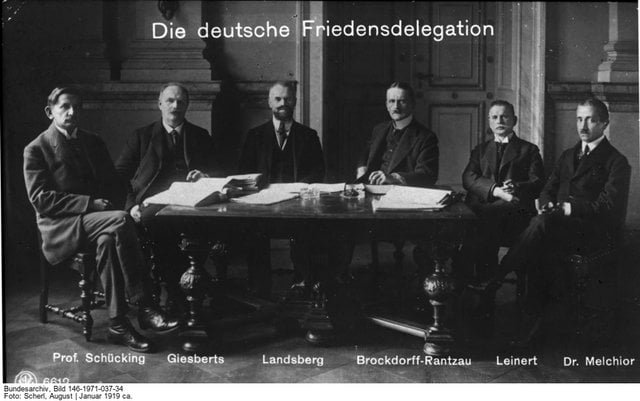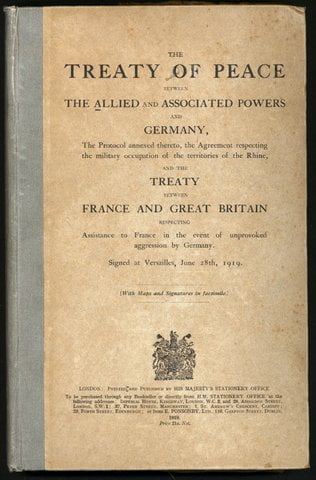German Passport 1919 – Treaty Commission Versailles
Diplomatic Passport Treaty Versailles
Can you imagine that after 100 years, such an important document came back on the surface? I am speechless! The travel document is a Ministerialpass (diplomatic passport) issued for a member of the German Treaty Commission (entourage) for Versailles. And I still can’t believe that this document is now on my desk just in front of me.

The Treaty of Versailles placed a heavy burden on Germany’s burgeoning democracy. It forced the country to pay billions in reparations; give up its colonies in Africa, Asia, and the Pacific region; and cede 13% of its territory to other nations. Among other things, Alsace-Lorraine became French, and most of West Prussia became Polish. The victorious powers — led by the United States, Britain, France, and Italy — declared Germany and its allies solely responsible for the outbreak of World War I. They accused the Germans of having forced them into war, thus holding them accountable for “all losses and damages” incurred. Diplomatic Passport Treaty Versailles
 The Treaty of Versailles was signed on June 28, 1919 — but not by Chancellor Philipp Scheidemann, who resigned rather than lend his signature to the accord. Germany only signed the treaty after the Allies threatened to invade the country. The Rhineland, incidentally, had remained occupied since the armistice of November 11, 1918.
The Treaty of Versailles was signed on June 28, 1919 — but not by Chancellor Philipp Scheidemann, who resigned rather than lend his signature to the accord. Germany only signed the treaty after the Allies threatened to invade the country. The Rhineland, incidentally, had remained occupied since the armistice of November 11, 1918.
In Germany at the time, many dismissed the treaty as a “dictated peace” due to its harsh terms. Eckart Conze, a historian at Marburg University, believes this outrage was “undoubtedly” justified. After all, the Germans never had any say in the negotiations.
Over 65 million people had fought in World War I, and more than 8.5 million military members and at least 6.6 million civilians died. The war decimated farmland, towns, and battlefields around Europe. And according to many, Germany was to blame. Though contemporary historians are still split on who should be held responsible for World War I, the treaty blamed and punished Germany.
European leaders signed the treaty in the Palace of Versailles’ Hall of Mirrors—the very place where the German Empire had been created, and Wilhelm II’s father made emperor in 1871. It was a slap in the face to Germany, whose residents saw the famous “war guilt” clause as a humiliation. (The United States did not ratify the treaty due to political division between Democrats and Republicans.)
Diplomatic Passport Treaty Versailles
The treaty’s aftermath
Though there was a real desire for peace in the wake of the disastrous war, the agreement did not achieve its intended effects. Furious at what they saw as a harsh “diktat” (a dictated peace), right-wing German politicians used the treaty as a nationalist rallying point. The staggering reparations payments reduced the country’s industrial output, and other forces thrust Germany into hyperinflation in the 1920s, which played into the economic instability of the Great Depression.
European leaders were dissatisfied with the redrawn map of Europe and the concessions they each had made in the name of uneasy peace, with some disappointed that Germany hadn’t been treated even more harshly.
In 2010, ninety years after the Treaty of Versailles went into force, Germany finally paid off the last installment of its war debt. By then, another world war was behind it. Today, the Treaty of Versailles lingers as a study in how, when it comes to war, unintended consequences can negate even the best intentions.
The Passport Diplomatic Passport Treaty Versailles
A green blank cardboard cover without Coat of Arms. The Ministerialpass (diplomatic passport) is a double folio fold-out paper issued by the German Foreign Office, Department of the Peace Treaty Negotiation, Passport Office, which classifies this passport, for me, as the most important document of German (passport) history. I do have other highly relevant documents in my collection. Still, I don’t exaggerate when I say that this diplomatic passport is now the most significant document I could acquire in 16+ years of collecting.




The passport number is V.16 and I assume V. stands for Versailles, which means at least 16 such passports for the treaty commission have been issued until May 9, 1919. I am delighted to have such a memorable document of German history in my collection.
Diplomatic Passport Treaty Versailles
FAQ Passport History
Passport collection, passport renewal, old passports for sale, vintage passport, emergency passport renewal, same day passport, passport application, pasaporte passeport паспорт 护照 パスポート جواز سفر पासपोर्ट
1. What are the earliest known examples of passports, and how have they evolved?
The word "passport" came up only in the mid 15th Century. Before that, such documents were safe conducts, recommendations or protection letters. On a practical aspect, the earliest passport I have seen was from the mid 16th Century. Read more...
2. Are there any notable historical figures or personalities whose passports are highly sought after by collectors?
Every collector is doing well to define his collection focus, and yes, there are collectors looking for Celebrity passports and travel documents of historical figures like Winston Churchill, Brothers Grimm, Johann Wolfgang von Goethe. Read more...
3. How did passport designs and security features change throughout different periods in history, and what impact did these changes have on forgery prevention?
"Passports" before the 18th Century had a pure functional character. Security features were, in the best case, a watermark and a wax seal. Forgery, back then, was not an issue like it is nowadays. Only from the 1980s on, security features became a thing. A state-of-the-art passport nowadays has dozens of security features - visible and invisible. Some are known only by the security document printer itself. Read more...
4. What are some of the rarest and most valuable historical passports that have ever been sold or auctioned?
Lou Gehrig, Victor Tsoi, Marilyn Monroe, James Joyce, and Albert Einstein when it comes to the most expensive ones. Read more...
5. How do diplomatic passports differ from regular passports, and what makes them significant to collectors?
Such documents were often held by officials in high ranks, like ambassadors, consuls or special envoys. Furthermore, these travel documents are often frequently traveled. Hence, they hold a tapestry of stamps or visas. Partly from unusual places.
6. Can you provide insights into the stories behind specific historical passports that offer unique insights into past travel and migration trends?
A passport tells the story of its bearer and these stories can be everything - surprising, sad, vivid. Isabella Bird and her travels (1831-1904) or Mary Kingsley, a fearless Lady explorer.
7. What role did passports play during significant historical events, such as wartime travel restrictions or international treaties?
During war, a passport could have been a matter of life or death. Especially, when we are looking into WWII and the Holocaust. And yes, during that time, passports and similar documents were often forged to escape and save lives. Example...
8. How has the emergence of digital passports and biometric identification impacted the world of passport collecting?
Current modern passports having now often a sparkling, flashy design. This has mainly two reasons. 1. Improved security and 2. Displaying a countries' heritage, icons, and important figures or achievements. I can fully understand that those modern documents are wanted, especially by younger collectors.
9. Are there any specialized collections of passports, such as those from a specific country, era, or distinguished individuals?
Yes, the University of Western Sidney Library has e.g. a passport collection of the former prime minister Hon Edward Gough Whitlam and his wife Margaret. They are all diplomatic passports and I had the pleasure to apprise them. I hold e.g. a collection of almost all types of the German Empire passports (only 2 types are still missing). Also, my East German passport collection is quite extensive with pretty rare passport types.
10. Where can passport collectors find reliable resources and reputable sellers to expand their collection and learn more about passport history?
A good start is eBay, Delcampe, flea markets, garage or estate sales. The more significant travel documents you probably find at the classic auction houses. Sometimes I also offer documents from my archive/collection. See offers... As you are already here, you surely found a great source on the topic 😉
Other great sources are: Scottish Passports, The Nansen passport, The secret lives of diplomatic couriers
11. Is vintage passport collecting legal? What are the regulations and considerations collectors should know when acquiring historical passports?
First, it's important to stress that each country has its own laws when it comes to passports. Collecting old vintage passports for historical or educational reasons is safe and legal, or at least tolerated. More details on the legal aspects are here...
Does this article spark your curiosity about passport collecting and the history of passports? With this valuable information, you have a good basis to start your own passport collection.
Question? Contact me...

